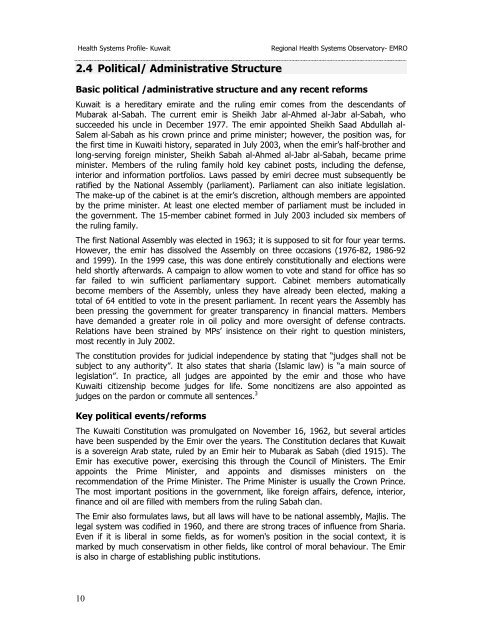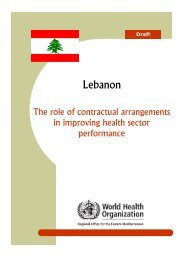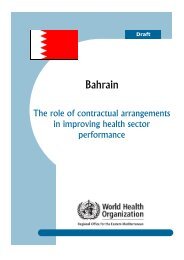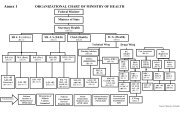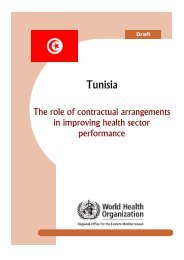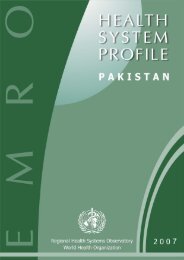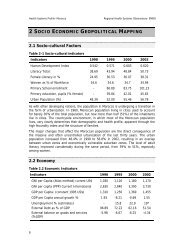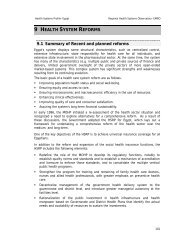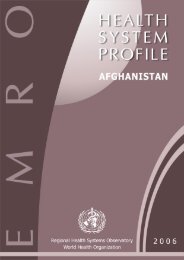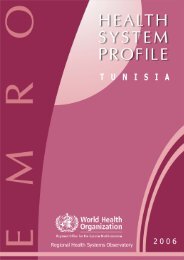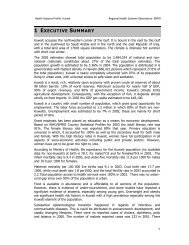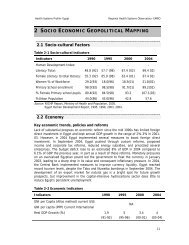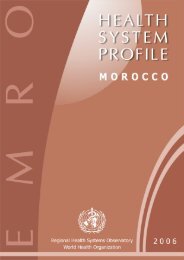Kuwait : Complete Profile - What is GIS - World Health Organization
Kuwait : Complete Profile - What is GIS - World Health Organization
Kuwait : Complete Profile - What is GIS - World Health Organization
You also want an ePaper? Increase the reach of your titles
YUMPU automatically turns print PDFs into web optimized ePapers that Google loves.
<strong>Health</strong> Systems <strong>Profile</strong>- <strong>Kuwait</strong> Regional <strong>Health</strong> Systems Observatory- EMRO<br />
2.4 Political/ Admin<strong>is</strong>trative Structure<br />
Basic political /admin<strong>is</strong>trative structure and any recent reforms<br />
<strong>Kuwait</strong> <strong>is</strong> a hereditary emirate and the ruling emir comes from the descendants of<br />
Mubarak al-Sabah. The current emir <strong>is</strong> Sheikh Jabr al-Ahmed al-Jabr al-Sabah, who<br />
succeeded h<strong>is</strong> uncle in December 1977. The emir appointed Sheikh Saad Abdullah al-<br />
Salem al-Sabah as h<strong>is</strong> crown prince and prime min<strong>is</strong>ter; however, the position was, for<br />
the first time in <strong>Kuwait</strong>i h<strong>is</strong>tory, separated in July 2003, when the emir’s half-brother and<br />
long-serving foreign min<strong>is</strong>ter, Sheikh Sabah al-Ahmed al-Jabr al-Sabah, became prime<br />
min<strong>is</strong>ter. Members of the ruling family hold key cabinet posts, including the defense,<br />
interior and information portfolios. Laws passed by emiri decree must subsequently be<br />
ratified by the National Assembly (parliament). Parliament can also initiate leg<strong>is</strong>lation.<br />
The make-up of the cabinet <strong>is</strong> at the emir’s d<strong>is</strong>cretion, although members are appointed<br />
by the prime min<strong>is</strong>ter. At least one elected member of parliament must be included in<br />
the government. The 15-member cabinet formed in July 2003 included six members of<br />
the ruling family.<br />
The first National Assembly was elected in 1963; it <strong>is</strong> supposed to sit for four year terms.<br />
However, the emir has d<strong>is</strong>solved the Assembly on three occasions (1976-82, 1986-92<br />
and 1999). In the 1999 case, th<strong>is</strong> was done entirely constitutionally and elections were<br />
held shortly afterwards. A campaign to allow women to vote and stand for office has so<br />
far failed to win sufficient parliamentary support. Cabinet members automatically<br />
become members of the Assembly, unless they have already been elected, making a<br />
total of 64 entitled to vote in the present parliament. In recent years the Assembly has<br />
been pressing the government for greater transparency in financial matters. Members<br />
have demanded a greater role in oil policy and more oversight of defense contracts.<br />
Relations have been strained by MPs’ ins<strong>is</strong>tence on their right to question min<strong>is</strong>ters,<br />
most recently in July 2002.<br />
The constitution provides for judicial independence by stating that “judges shall not be<br />
subject to any authority”. It also states that sharia (Islamic law) <strong>is</strong> “a main source of<br />
leg<strong>is</strong>lation”. In practice, all judges are appointed by the emir and those who have<br />
<strong>Kuwait</strong>i citizenship become judges for life. Some noncitizens are also appointed as<br />
judges on the pardon or commute all sentences. 3<br />
Key political events/reforms<br />
The <strong>Kuwait</strong>i Constitution was promulgated on November 16, 1962, but several articles<br />
have been suspended by the Emir over the years. The Constitution declares that <strong>Kuwait</strong><br />
<strong>is</strong> a sovereign Arab state, ruled by an Emir heir to Mubarak as Sabah (died 1915). The<br />
Emir has executive power, exerc<strong>is</strong>ing th<strong>is</strong> through the Council of Min<strong>is</strong>ters. The Emir<br />
appoints the Prime Min<strong>is</strong>ter, and appoints and d<strong>is</strong>m<strong>is</strong>ses min<strong>is</strong>ters on the<br />
recommendation of the Prime Min<strong>is</strong>ter. The Prime Min<strong>is</strong>ter <strong>is</strong> usually the Crown Prince.<br />
The most important positions in the government, like foreign affairs, defence, interior,<br />
finance and oil are filled with members from the ruling Sabah clan.<br />
The Emir also formulates laws, but all laws will have to be national assembly, Majl<strong>is</strong>. The<br />
legal system was codified in 1960, and there are strong traces of influence from Sharia.<br />
Even if it <strong>is</strong> liberal in some fields, as for women's position in the social context, it <strong>is</strong><br />
marked by much conservat<strong>is</strong>m in other fields, like control of moral behaviour. The Emir<br />
<strong>is</strong> also in charge of establ<strong>is</strong>hing public institutions.<br />
10


